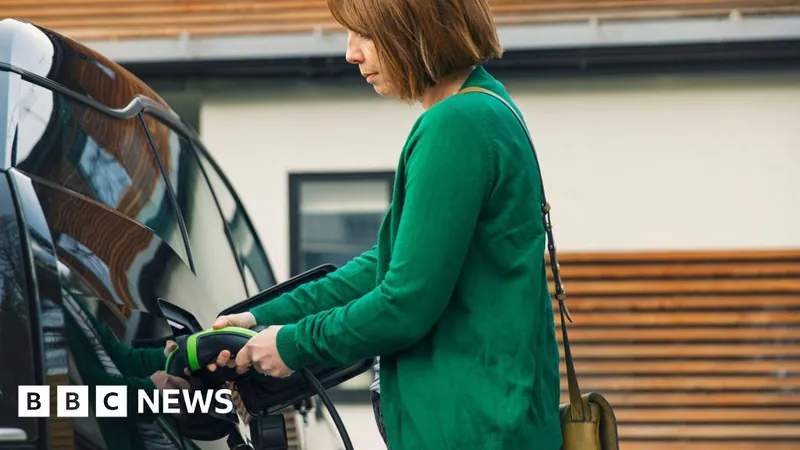
Ford Urges Government to Boost Electric Vehicle Demand Amid Industry Crisis
2024-11-27
Author: Ling
Ford's Urgent Call to Action
In a bold move, Ford UK is pressing the government for immediate incentives to drive electric vehicle (EV) sales as mounting pressures from industry stakeholders reveal a potential crisis in the automotive landscape. Lisa Brankin, Ford UK's chair and managing director, emphasized during a recent BBC interview that simply mandating higher EV production without accompanying demand won't suffice.
Tensions Rise as the Automotive Industry Faces Challenges
As the government prepares to phase out new petrol and diesel cars within a few years, tensions between policymakers and the automotive industry have escalated. This discord was underscored earlier this week when Stellantis, the owner of Vauxhall, announced the closure of its Luton plant, jeopardizing 1,100 jobs in the wake of stringent EV targets.
Government Response and Job Security Concerns
Describing Stellantis’ decision as “a dark day for Luton,” Business Secretary Jonathan Reynolds underscored the severity of the situation in the House of Commons. Ford isn't immune to the industry's struggles either, with its recent announcement of plans to cut 800 jobs in the UK over the next three years—an action attributed to both the EV targets and intensified competition.
Ford's Commitment to Electrification
Brankin's call for government-backed incentives is a reflection of the substantial investments Ford has made in electrification, exceeding £350 million in the UK alone. “We need to make these efforts pay off,” she stated, highlighting the urgency of the matter amidst broader concerns over the future of car manufacturing in the UK.
The Shift Towards Luxury Vehicles
Compounding the issue, industry analysts suggest that the shift towards luxury vehicles at the expense of more affordable options is exacerbating Ford’s troubles. The weight of past decisions looms large, as Ford recalls the closure of its Bridgend factory in 2020, which resulted in the loss of 1,644 jobs, citing factors like the COVID-19 pandemic as part of the rationale. Meanwhile, Vauxhall’s previous ownership had flagged Brexit as a significant threat to operations at the Luton facility.
Debate Over Future Vehicle Regulations
Though the current Labour government maintains its commitment to a 2030 ban on new petrol and diesel vehicle sales, shadow business secretary Andrew Griffith warns that such targets could harm job security, dubbing the initiative a "jobs killer." While the former Conservative government originally aimed for a 2030 deadline, they altered it to 2035 without relinquishing penalties for non-compliance, leading to a convoluted regulatory landscape.
Strict Sales Quotas and Their Impact
Companies now face stringent mandates requiring 22% of their car sales to be zero-emission by this year, with increasing targets set for subsequent years. Failure to meet these numbers incurs hefty fines, which could ultimately stifle innovation and investment in the sector, according to concerned voices within the industry.
Concerns Over Sustainability of EV Market Growth
Despite the growing uptake of electric vehicles—20% of cars registered in October were EVs—industry insiders caution that this growth is mainly driven by unsustainable discounting and promotional pricing, rather than genuine market demand.
Industry Leaders Call for Reevaluation of Policies
During a networking dinner hosted by the Society of Motor Manufacturers and Traders (SMMT), Reynolds expressed "profound concern" over the enforcement of zero-emission policies and their unexpected consequences on business. He highlighted ongoing discussions with key automotive firms aimed at reassessing the feasibility of current EV regulations, including innovative suggestions like sales credits transferring between cars and vans.
The Need for Government Action
As the automotive sector grapples with these challenges, the SMMT has called for immediate government action to protect the industry, asserting that weak demand coupled with rigorous sales quotas could lead to severe ramifications for both business stability and job security. Manufacturers like Nissan, which produces EVs in Sunderland, have warned that current regulations threaten the viability of car manufacturing in the UK and jeopardize future investments.
The Future of Electric Vehicle Transition
As the electric vehicle revolution gathers momentum, the call for effective policy measures is clearer than ever: without strategic incentives and robust support from the government, the transition to greener transportation may face insurmountable challenges. Will the government rise to the occasion or will the wheels of progress stall?


 Brasil (PT)
Brasil (PT)
 Canada (EN)
Canada (EN)
 Chile (ES)
Chile (ES)
 España (ES)
España (ES)
 France (FR)
France (FR)
 Hong Kong (EN)
Hong Kong (EN)
 Italia (IT)
Italia (IT)
 日本 (JA)
日本 (JA)
 Magyarország (HU)
Magyarország (HU)
 Norge (NO)
Norge (NO)
 Polska (PL)
Polska (PL)
 Schweiz (DE)
Schweiz (DE)
 Singapore (EN)
Singapore (EN)
 Sverige (SV)
Sverige (SV)
 Suomi (FI)
Suomi (FI)
 Türkiye (TR)
Türkiye (TR)